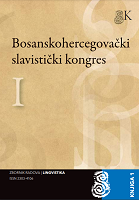Glasovne promene u imeničkoj deklinaciji slovačkog i srpskog jezika
Sound Changes in Noun Declension in Slovak and Serbian
Author(s): Ana MarićSubject(s): Comparative Linguistics, Western Slavic Languages, South Slavic Languages
Published by: Slavistički komitet BiH
Keywords: Nouns; declension; sound changes; Slovak; Serbian;
Summary/Abstract: The paper discusses sound changes, or alternations, which occur with noun declensions in two close Slavic languages. The starting point is the essence of the changes. First are discussed changes of the same character in both languages, such as vowel alternations with the grammatical zero (silent vowels), e.g. pes – psa, pas – psa, veniec – venca, venac – venca, uhol – uhla, ugao – ugla, then assibilation in plural nouns, e.g. žiak – žiaci, đak – đaci, vojak – vojaci, vojnik – vojnici... Next, attention is focused on specific changes in both languages, such as quantitatve alternations of long and short vowels in Slovak, e.g. vietor – vetra, mráz – mrazu; mestá – miesta; žena – žien, dievka – dievok... or changes of ‘l’ into ‘o’, extensions of the base, simplification of consonant clusters, assimilation, palatalization, etc. in Serbian, e.g. orao – orla; sestra – sestara, san – snovi, zec - zečevi; vrabac – vrapca; predak – preci; drug – druže, vojnik – vojniče.
Journal: Bosanskohercegovački slavistički kongres
- Issue Year: I/2012
- Issue No: 1
- Page Range: 441-449
- Page Count: 9
- Language: Serbian

